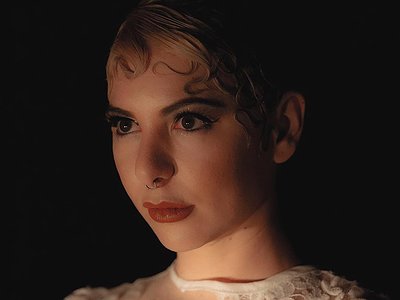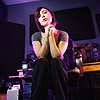Take us through a day in your life, from a possible morning routine through to your work, please. Do you have a fixed schedule? How do music and other aspects of your life feed back into each other - do you separate them or instead try to make them blend seamlessly?
I am a reformed sleeper-in-er so I try to wake up around 8 each morning and attempt to have a healthy productive day.
It always starts with coffee and a dog walk where I usually listen back on whatever project I'm working on at the time. That's when I make most of my notes. After that I do a two hour workout followed by lunch, and maybe run a couple errands. It's a pretty normal routine in the first half of the day which seems to lend me a bit of sanity. But after that it's studio time. There I'll work on anything from music to designing merch to doing interviews (like right now). I've compartmentalized a lot of my creativity as I've gotten older because it's too easy for me to spiral when I don't have boundaries.
Exercising and eating healthy has very little impact on my mental wellbeing (even though I do it anyway) but allocating sacred time for my creativity does help keep me from becoming too overwhelmed.
Can you talk about a breakthrough work, event or performance in your career? Why does it feel special to you? When, why and how did you start working on it, what were some of the motivations and ideas behind it?
The obvious answer that comes to me is my tour with Gary Numan. That all came about because I covered his song "Metal" and threw it up on Youtube. This was one instance where I was able to break my bad habit of sitting on my material and it ended up paying off. This is why I stress to everyone that it's important for you to release your work no matter how badly you want to wait for the "perfect moment". You never know what's going to happen when it's out there.
But yeah, it's almost bittersweet to think that my touring experience peaked so early on. It was such a magical time, Gary and his family and crew are amazing, the whole thing was like a dream. In terms of music making I think my latest album YOU AND I WILL NEVER DIE was a creative breakthrough for me. It was the first time I had sat down and written an album from start to finish instead of just rounding up a collection of songs and tossing them together. Not to disparage my previous work but I think the emotional and stylistic flow of this album has allowed me to tell more of a story through the album as a whole. It's the album I've always wanted to make so I feel a huge sense of fulfillment now that it's ready to be shared with the world.
There are many descriptions of the ideal state of mind for being creative. What is it like for you? What supports this ideal state of mind and what are distractions? Are there strategies to enter into this state more easily?
I don't really believe that creativity is a state of mind so much as it is a muscle. I think it's really counterproductive to tell people that creativity is this otherworldly state that only the enlightened can access. I think that makes the notion of creativity daunting and discourages people from making art. I've heard so many people say "I'm just not creative" and I think that's ridiculous.
Being creative is about free association and flow. Everyone has the ability to get into this headspace but I've realized that the way to access this is by relaxing. In the same way that meditation starts off as literally just closing your eyes and breathing, creativity is just sitting down playing around. It's a muscle that gets strengthened as long as you do it. The flow comes from relaxing and letting go of whatever roadblocks are in your head trying to filter you. My dad once said "Art is three percent creativity and ninety-six percent hard work. No one knows what the last one percent is."
Music and sounds can heal, but they can also hurt. Do you personally have experiences with either or both of these? Where do you personally see the biggest need and potential for music as a tool for healing?
I have to admit that I am guilty of using music as a weapon. Not violently, but in a way that channels whatever violence and anger I have into a more manageable form of revenge. That sounds dramatic but I think we all have that thought that goes, "Oh you'll be sorry once I write a song about you." In that way music is manageable violence. You could apply that to all sorts of music from Rage Against the Machine to Fiona Apple's latest album. In terms of it being healing I think that's a more obvious aspect of music that everyone can touch upon. When I'm in specific moods there are certain songs I go to as if I were reaching for a bottle of pills. Music is sacred like that.
There is a fine line between cultural exchange and appropriation. What are your thoughts on the limits of copying, using cultural signs and symbols and the cultural/social/gender specificity of art?
For me the line between exchange and appropriation is pretty blurry but when it comes down to it I just ask myself "how authentic is this?" Wearing a culture as a way to promote your image is disingenuous but I think we should be wary of gatekeepers. I love what comes from genuine curiosity and enthusiasm someone can have regarding concepts and symbols they didn't have the fortune to inherent. If we limit what people are allowed to engage with we end up segregating the world into little insular groups which causes more division and tension in the long run. I think something can be sacred while also being fair game for experimentation. I feel this way about Catholic art and early religious symbolism. I feel awe when I step into a cathedral but I can also think a re-branded image of the virgin on a tee shirt is cool too.
Our sense of hearing shares intriguing connections to other senses. From your experience, what are some of the most inspiring overlaps between different senses - and what do they tell us about the way our senses work?
I love how certain songs can remind me of specific places. PJ Harvey's "White Chalk" reminds me of walking down this one street in Copenhagen I took to get to the open air market. "All That Could Have Been" takes me back to my twin bed in Salt Lake where I cried over some boy that dumped me. The connection between music and memory is amazing and as someone who can be a little spacey I find it useful to use music as a memory filing system.
However I've always found music to be overstimulating in this way. I have a hard time putting on music in the background because my mind automatically goes into overdrive and I suddenly find myself analyzing everything. It's never been a soothing experience for me, unfortunately. Maybe that will change as I get older.
Art can be a purpose in its own right, but it can also directly feed back into everyday life, take on a social and political role and lead to more engagement. Can you describe your approach to art and being an artist?
I wish I had more of one to be honest. I think that art just comes down to authenticity. Whether something is appealing is subjective but I think true authenticity is apparent. Whatever message someone puts in their art is sort of besides the point, for me at least. I'm more interested in the general feeling behind it. I think that feeling is more impactful on the listener than just the stated point. I don't even think art really needs a point actually. It just is, like a platonic form. The fact that we can create at all is the most sacred part of art, which is why I can have appreciation for vapid pop music as well as complex classical works.
I think I'm maybe a bit more insular than most people though. The space in which political art and music inhabit is large and important. But I see Art (capital A) as existing outside of conscious endeavors, which leads me to believe that any song can be a song about peace, war, acceptance, revolution, etc. if that is what the listener takes from it.
What can music express about life and death which words alone may not?
It's very hard to describe the profundity of death. Music is so captivating because it can emulate indescribable emotions and be a vehicle in which people can experience these emotions genuinely but from a safe distance.
I cried my eyes out when I first heard the song "When the Roses Bloom Again" by Billy Bragg and Wilco. It's about a soldier called out to war who writes one last note to his lover before he dies. The depth of detail in the lyrics and the melodic movements create this insurmountably profound and grief stricken track. The crazy thing about it is that I doubt Billy Bragg ever lost a lover to war yet somehow he was able to emulate this intense experience flawlessly. So flawlessly to the point where the listener can feel the gravity of an experience that's entirely fictitious.



